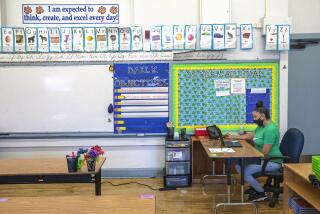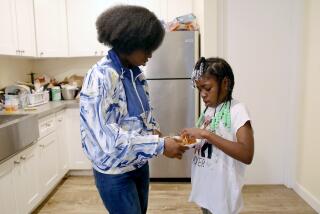Office Computers ‘Retire’ to Fun and Games
- Share via
COLUMBIA, S.C. — Like a lot of public housing, the cramped apartment Marion Thompson shares with her five children has no telephone. But it does have a computer.
Thompson, 29, obtained the computer and a printer free through the Computer Kids program, an effort by the Columbia Housing Authority to place donated equipment in the city’s 2,400 public housing units.
Thompson, a working single mother on welfare, had to promise to take a computer class and to show her children’s report cards to the housing authority.
“It really wasn’t a hassle at all,” she said. “This was a good idea. They learn how to use computers at school.”
Eight-year-old Edward McGill proved his mother’s point by jumping in front of the keyboard on the recent afternoon that the computer arrived and was set up on a card table. In seconds, he had a word game up and running.
Soon, five pairs of young hands were jockeying for a position at the keyboard, and Mom decided that a daily schedule would have to be posted.
In a state where the average welfare mother has about a fifth-grade education, a computer can help children learn skills their mothers never acquired, housing authority spokeswoman Nancy Stoudenmire said.
“Kids in low-income neighborhoods may have never touched a computer,” Stoudenmire said. “The more you use it, the easier it becomes.”
Since early 1995, low-income residents in Columbia have had access to centrally located computers in their apartment complexes. That model also is used in other states, including North Carolina, Virginia and California.
But Columbia’s housing authority wanted to make sure the donated computers got used.
Stoudenmire said computer skills can be an equalizer in classrooms where children from public housing are taught side by side with those from the city’s most affluent neighborhoods.
“In order to break the cycle of poverty and welfare dependence, you have to focus on education,” Stoudenmire said. “It’s the only way to get out of this cycle.”
The Housing Authority has distributed more than 60 computers and plans to give out 250 by next April. The program depends almost entirely on volunteers and donations, except for a technician who works about 15 hours a week and is paid with a federal grant.
Businesses donate their used and outdated equipment. Volunteers clean and repair the equipment, install spelling and math games and word processing software, and deliver the computers.
Thompson calls her computer a blessing. Others may call it a relic. Her model was sold between 1989 and 1991 and operates at a speed of 16 megahertz. A typical machine today runs nearly 10 times as fast.
“Most of the time, the computers we get work. They’re just outdated,” said Matthew Penn, who repairs the computers. “For the small amount of effort we have to do, it’s stupid for us not to try.”
In contrast, Emma Hernandez, who maintains computer centers at Los Angeles’ housing projects, solicits corporate donations to buy new computers. “To give someone something’s that outdated, it really doesn’t do any good,” she said.
But Stoudenmire said she has seen results: “We’ve had feedback from teachers who could see that these kids were all of a sudden doing better in the classroom.”
More to Read
Sign up for Essential California
The most important California stories and recommendations in your inbox every morning.
You may occasionally receive promotional content from the Los Angeles Times.













